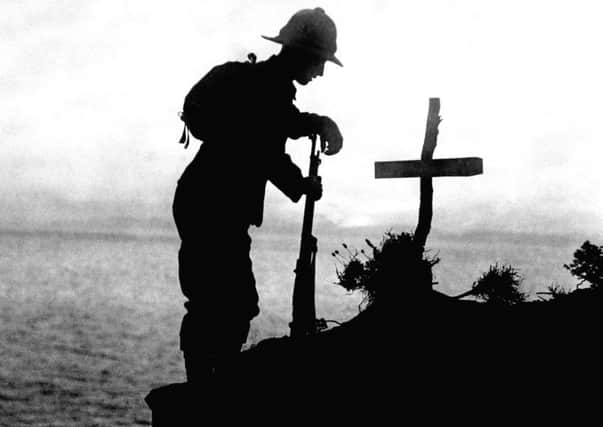A hundred years later, tributes to the men of Gallipoli


He will travel from his home near Northallerton to join descendants of British and Irish Gallipoli veterans who will travel to Turkey this week to mark the centenary, along with the Prince of Wales and Prince Harry, of the doomed campaign.
While Anzac Day, on April 25, has long been celebrated by Australia and New Zealand, some relatives feel the British involvement in the heroic but disastrous landings has been overlooked, particularly when the statistics show around three times as many British and Irish casualties of the conflict as Anzacs.
Advertisement
Hide AdAdvertisement
Hide AdThe Princes will meet descendants on Friday and attend commemoration events on the Gallipoli peninsula, before taking part in Anzac events the following day marking the 100th anniversary of the first landings.
Mr Gillespie, 72, has visited the peninsula before and stood close to the spot where his grandfather Lt Col Franklin Gillespie died aged 42, while leading a daring assault which involved attacking across wild scrub, uphill, at night.
He said: “It is incredibly rugged, with steep ravines and gullies, and it is covered with very unpleasant holly oak, rather like gorse and covered with sharp leaves, so it was very difficult country to go through.
“And of course, the Allies were always attacking up hill.”
As the campaign stagnated into trench warfare, soldiers faced heat, poor sanitation, lack of supplies, then intense cold and flooded trenches.
Advertisement
Hide AdAdvertisement
Hide Ad“It is astonishing what the soldiers put up with, the terrible conditions and the very high likelihood of being shot,” he said.
Roger Boissier was a 12-year-old schoolboy when he asked why his father became agitated if he saw a bluebottle buzzing around the room. His father’s stark response was that if he too had seen flies crawling over dead men’s faces, he would understand.
Mr Boissier, who was chairman of the Royal Derby Porcelain Company, and who lives near Carlisle, still has a letter in which his father speaks in glowing terms of their Australian comrades.
He described them as fitter and bigger than the British. The Royal Naval Division Lieutenant-Commander wrote: “They are absolutely fearless, they cannot believe they could be killed.
“They are cheerful men, it is good to see them,” he said.
Advertisement
Hide AdAdvertisement
Hide AdHowever around 58,000 Allies did die, and around half the 559,000 servicemen were casualties. The campaign ended in failure, and failed in its bid to change the course of war.
Winston Churchill had pushed forward the plan, and he was tainted when it ended in ignominy.
Mr Boissier said: “My father didn’t think much of Churchill until 1940.
“As a schoolboy I remember hearing remarks about him, but that all changed and he said ‘I suppose we have the best man possible.’”
Advertisement
Hide AdAdvertisement
Hide AdSir James Dunbar-Nasmith, 88, an architect from Findhorn, Moray, Scotland, will honour his father Martin who was awarded the Victoria Cross for commanding a submarine crew which sank 97 enemy vessels.
Sir James said his father, who lived to be 83, was a modest man and although he could have told tales of escaping nets and mines to sneak through the Dardanelles straits into the Sea of Marmara, he did not speak of his wartime heroics.
“I don’t think people do if they have been very brave,” his son said.
READ MORE...